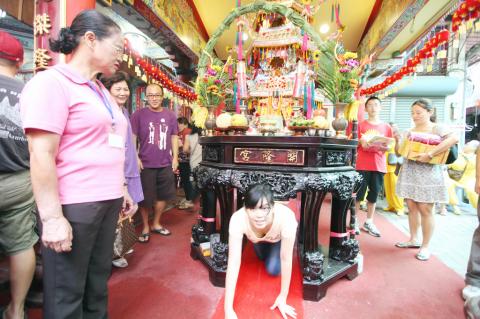“Coming-of-sixteen” (做十 六歲), a tradition unique to Tainan in which teenagers take part in a ceremony to celebrate their 16th birthday, was held at several temples in Tainan City yesterday. A number of Japanese media outlets were also invited to witness the celebrations.
The celebration is traditionally held on the seventh day of the seventh lunar month, which this year fell on Aug. 23.
Among the participating temples, the Kailong Temple (開隆宮) is the most well-known for staging the coming-of-age celebration.

Photo: CNA
Former Tainan mayor Hsu Tain-tsair (許添財) promoted the festivity by inviting all the temples in the city to participate.
The celebration subsequently became so popular that some temples in the city also hold coming-of-age celebrations for Christian residents.
Tainan Mayor William Lai (賴清德) yesterday attended several coming-of-age celebrations at different temples.
The rituals in the coming-of-age celebrations are rather simple; participants have to crawl under the offering table and burn money for the immortals, Tainan residents said.
Young adults who have completed the rites then parade through streets of Tainan in traditional costumes on horseback, they said.
Residents said the coming-of-age ritual is celebrated in Tainan at the age of 16 because centuries ago child workers were paid half the adult salary until the age of 16.
When the children turned 16, parents would hold a feast for their employers, their family and friends to announce the good news.

Alain Robert, known as the "French Spider-Man," praised Alex Honnold as exceptionally well-prepared after the US climber completed a free solo ascent of Taipei 101 yesterday. Robert said Honnold's ascent of the 508m-tall skyscraper in just more than one-and-a-half hours without using safety ropes or equipment was a remarkable achievement. "This is my life," he said in an interview conducted in French, adding that he liked the feeling of being "on the edge of danger." The 63-year-old Frenchman climbed Taipei 101 using ropes in December 2004, taking about four hours to reach the top. On a one-to-10 scale of difficulty, Robert said Taipei 101

A preclearance service to facilitate entry for people traveling to select airports in Japan would be available from Thursday next week to Feb. 25 at Taiwan Taoyuan International Airport, Taoyuan International Airport Corp (TIAC) said on Tuesday. The service was first made available to Taiwanese travelers throughout the winter vacation of 2024 and during the Lunar New Year holiday. In addition to flights to the Japanese cities of Hakodate, Asahikawa, Akita, Sendai, Niigata, Okayama, Takamatsu, Kumamoto and Kagoshima, the service would be available to travelers to Kobe and Oita. The service can be accessed by passengers of 15 flight routes operated by

Taiwanese and US defense groups are collaborating to introduce deployable, semi-autonomous manufacturing systems for drones and components in a boost to the nation’s supply chain resilience. Taiwan’s G-Tech Optroelectronics Corp subsidiary GTOC and the US’ Aerkomm Inc on Friday announced an agreement with fellow US-based Firestorm Lab to adopt the latter’s xCell, a technology featuring 3D printers fitted in 6.1m container units. The systems enable aerial platforms and parts to be produced in high volumes from dispersed nodes capable of rapid redeployment, to minimize the risk of enemy strikes and to meet field requirements, they said. Firestorm chief technology officer Ian Muceus said

MORE FALL: An investigation into one of Xi’s key cronies, part of a broader ‘anti-corruption’ drive, indicates that he might have a deep distrust in the military, an expert said China’s latest military purge underscores systemic risks in its shift from collective leadership to sole rule under Chinese President Xi Jinping (習近平), and could disrupt its chain of command and military capabilities, a national security official said yesterday. If decisionmaking within the Chinese Communist Party has become “irrational” under one-man rule, the Taiwan Strait and the regional situation must be approached with extreme caution, given unforeseen risks, they added. The anonymous official made the remarks as China’s Central Military Commission Vice Chairman Zhang Youxia (張又俠) and Joint Staff Department Chief of Staff Liu Zhenli (劉振立) were reportedly being investigated for suspected “serious